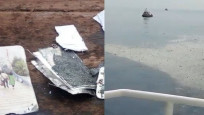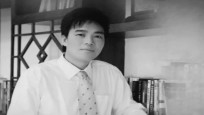[文字实录]创业记专访以色列创业教父
2015年06月15日 19:13
来源:凤凰科技
以色列,这个人口只有813万,国土面积只有2.57万平方公里的国家,为何能成为当今世界上公认的经济、军事和科技强国? We are forced to think globally. We have
以色列,这个人口只有813万,国土面积只有2.57万平方公里的国家,为何能成为当今世界上公认的经济、军事和科技强国?
We are forced to think globally. We have no local market and we are also cut off from the regional market.
我们必须要有全球思维。因为本地市场几乎没有机会,周边市场呢又把我们排除在外。
《以色列:创业的国度》一书试图从多角度揭秘其创新成功的关键,例如政府支持、良好的风险投资运营模式、海外流散的犹太人的技术和资本反哺。
We talked about a number of big factors. And all of them connect to this issue of drive and determination and willingness to take risk.
我们讨论了好些观点,但他们本质上都与一件事相关:进取心、决心、愿意承担风险的责任心。
以色列能成为创业国度与其国民极高的创新能力不可分割。而以色列创业教父则认为:
I believe Israeli mother is an over-achiever. Beyond every successful entrepreneur, there is a very pushy mother.
我相信以色列母亲们是极度追求成就的。在每一个成功创业者的背后,都有一个上进的母亲。
两位以色列投资人和意见领袖对中国的创业环境有何印象?
China, you’re born mobile. So you understand it better.
你们中国生来就是移动互联的,所以你们能够深刻理解它。
在他们看来,创业需要的基本素质又有哪些?
It’s not that they like risk; it’s that they are willing to take risk because they believe so much in what they are trying to build.
他们并不比常人更喜欢风险。他们只是选择了承担风险,因为他们充分相信自己在尝试建立的公司。
I think people have to be born as entrepreneur, or at least they have to be groomed or raised up with this idea that entrepreneurship is something they want to do,
我认为创业者必须是天生的,或者说至少是在这种环境下长大的。创业者精神是他们想要努力实现的东西,
本期创业记格欣对话以色列创业教父、投资人Yossi Vardi和《以色列:创业的国度》作者之一Saul Singer,聊聊小国以色列的创新大智慧。
【嘉宾介绍】
Yossi Vardi被誉为以色列的“科技创业教父”,1969年,年仅26岁的他创办了以色列最早的软件公司;之后,他渐渐转身为一位VC, 其最著名的投资案例便是作为天使投资了即时通讯软件鼻祖ICQ,而其中国版正是OICQ 也就是QQ的前身。
Saul Singer是一位美籍-以色列籍的记者和作家,他曾经是《华盛顿邮报》和《华尔街日报》等知名报刊的专栏作者。不过,他最为人所知的身份是《创业的国度:以色列经济奇迹的启示》一书的作者。此书的中文版销量超过10 万册。书中所展现的以色列人的创新创业精神,对时下中国经济社会的发展有着重要的借鉴意义。
【第一段】
格欣: what is the key message that you want to convey in this afternoon speech?
Singer:So really the key message was that China is an innovative country, Israel is also an innovative country. And the most exciting opportunity we have is to innovate together. We have different strengths we have different things we can offer to each other to help us innovate together faster.
格欣:您今天下午的演讲所传达的主要信息是什么?
Saul Singer:主要信息就是,中国是一个创新型国家,以色列也是一个创新型国家,最令人激动的机会是我们能联手合作,共同创新。
我们彼此强项和弱项各有不同,但是我们能提供给对方不同的东西,以此助两国共同创新,更快地创新。
格欣:How? How can we innovate together faster?
Singer:So one model is the model that’s already been developed by the United States a long time ago with Israel, which is the big companies like Google and Microsoft and Facebook and so on, coming to Israel and buying startups as a way to help them innovate. And now we have also Chinese companies like Huawei and Alibaba, Xiaomi and others are coming now increasingly to Isreal. This is very new to Israel.
记者:我们应如何做才能达成这样的目标呢?
Saul Singer:在很久之前,美国与以色列就共同开发出一种模式,让谷歌、微软、脸书这样的大企业进入以色列,收购一些新兴公司来帮助他们创新。现在我们也有很多像华为、阿里巴巴、小米这样的中国企业进驻我国,这对以色列来说是全新的。
【第二段】
配音:今年1月,阿里巴巴投资了以色列二维码技术创业公司视觉码。这是阿里对以色列创业公司的首笔投资。3月份又注资了以色列风险投资基金JVP。华为、小米等手机厂商也纷纷在以色列投资收购。尤其在近两年来,中国巨头对以色列的明星公司可谓趋之若骛。
Singer: For a number of years Israeli companies have tried to come to China to sell things. I don’t think it works that well. Because I don’t think it works so well to invent something in Israel, to solve an Israeli problem, and expect that’ll be the same problem in China. And I think the better way to do it is to invent things together, basically, for the Chinese entrepreneur to come with the Chinese problem and one that we would not have imagined in Israel, and for us to try to solve it together. That I think is the powerful opportunity going forward which actually hasn’t happened enough yet.
Saul Singer:很多年来,以色列企业试图进入中国区销售,我认为成果一般。我觉得更好的方式是合作开发,中国企业家带来中国式的问题,这些问题我们在以色列是想不到的,我们共同合作,一起来解决这个问题,我认为这才是强有力的合作机会,但目前这种机会并不多。
格欣:What are the strengths of each other?
Singer:We are very good at solving problems, we love to solve problems. In fact if you tell an Israeli it’s impossible to solve, they get very excited and they work very hard at it. And we are good at globalization because we are such a tiny country; we are forced to think globally. We have no local market and we are also cut off from the regional market. So those are Israeli strength. But we have a lot of weaknesses, too. We don’t know how to build big companies. The companies that you have in China, the small companies that you have are bigger than our big company. We don’t know how to build those kinds of companies.
记者:双方的优势力量在什么地方?
Saul Singer:我们很擅长解决问题,也很喜欢去解决问题。假如你跟一个以色列人说,这问题没法解决,他会很兴奋,会尽全力去解决它。同时,我们也擅长使产品全球化。因为我们国家太小了,环境迫使我们在全球的视野下思考问题。我们没有本土市场,也被割离于区域市场之外,因此每个公司在成立之初就开始思索全球化问题,这就是以色列的实力。但我们也有很多弱点,我们不知道怎样建立大企业。中国的小企业都比我们的大企业要大,我们不懂如何建立这样的大企业。
格欣:You invested ICQ in 1996 and sold to another America company in 1998. Why it’s so fast, why did not the team think about growing it, until it became a giant?
after two-three years.
Yossi Vardi:Because AOL gave us the offer which you could not refuse, and we say ‘thank you, very much’, we made a wonderful relationship with them, we are very pleased for sold it to the right person.
This is a common dilemma for entrepreneurs, should we be geting out and should try to be the giant, You have to realize if you want to get China giant capability of success, it’s a very small research which was the latest. When you do an early exit, number one is to eliminate the risk of flying to be bankrupted, number two is you can take the money, invest in other opportunities, and create additional value by investing the money, as I said, I invested the money as I sold the ICQ and take the part of money to invest 85 companies, for me,this is another good income,
格欣:您在1996年投资了ICQ,并在1998年卖给了一家美国公司,为何这么快就将它卖了?你们的团队为何没有考虑继续发展壮大,直至将它打造成为一家科技巨头?
约西·瓦尔迪:因为AOL给出了我们难以拒绝的报价,所以我们说“非常感谢”,并与他们建立了非常好的关系,我们也很高兴将公司卖给了合适的人。
这是创业者面临的一个常见问题,你应该走出来,向着巨头的目标努力,但你必须意识到,如果你想要达到中国巨头那样的高度,那么就要明白有多么困难。当你在经营多年后退出,如果是早早退出,那么第一个问题是消除破产的风险,第二个问题则是,你可以拿着出售公司所得到的收益,投资其他市场机遇,通过融资创造额外价值。就我而言,在卖了ICQ以后,我用其中一部分资金投资了85家公司。对于我来说,这些投资又让我大赚一笔。
格欣:Do you think you just chose an easy way to succeed, because establishing cooperation with larger companies to help you grow, is definitely easier than growing by yourself.
Yossi Vardi:Yes, you can run a company, and could grow it, but I think, to go and invest 85 additional companies was much more interesting than spending all you life on one thing.In Israel, a lot of companies which have been sold to large multinational companies, which came to Israel, create jobs in Israel. They are not very well-known, but I think a big part of Israel miracle belong to these joining forces between Israel and large companies, attracting foreign companies to invest in the technology is a major and crucial part of this strategy and of the gradually national success.
格欣:您是否认同您只是选择了取得成功的捷径,因为与大公司建立合作帮助自身实现增长,肯定要比自力更生更容易。
约西·瓦尔迪:是的,你可以经营一家企业,实现它的增长。但是,我认为出去投资85家公司,远远比一生就做一件事情更有趣。以色列也有不少公司卖给了大型跨国企业,他们开辟以色列市场,给当地创造就业。他们不太出名,但我认为以色列的企业很大程度上要归功于以色列本土企业与跨国大公司之间的联合。吸引外国公司对高科技行业进行投资,是这种战略的重要组成部分,也是国家逐渐走向繁荣昌盛的重要原因。
【第三段】 Vardi的创业投资经
Yossi Vardi的创业投资三部曲是:创业、在合适的时机将公司卖出、再去进行下一段创业或者转型投资人。然而当不少创业者听到有人提出:“Hey,你觉得把公司卖了怎样?”时的反应是完全懵了。很多中国创业者的目标是成长、上市,而不是出售它。然而在以色列,情况有点不同。
格欣:I mean he just started up. Is this the commonality in Israel?
Singer:I think that a lot of people believe that entrepreneurs who sell their company, their startup, that they are impatient or greedy or something like that. That’s not usually the main thing. The main thing is that they realize that when they get their companies to a certain level, the next stage is a completely different process of turning that idea into big company. That’s a management problem, sales, marketing; it’s not an innovation problem, right? So the entrepreneurs, they like to innovate. They don’t like that second part of the process of building a big company.
格欣:我意思是他才刚开始创业……这在以色列是一个共性吗?
Saul Singer:我想很多人都认为,那些把创业公司卖掉的企业家要么急躁,要么贪婪,实际上并不是那么回事儿。重要的是他们意识到,自己将公司发展到一定程度时,下一个阶段是要把创意发展为一家大型企业,这是一个截然不同的过程,不再是一个创新的问题,而是一个管理、营销和市场层面上的问题。因此,企业家喜欢创业,但并不喜欢接下来这个把企业做大的阶段。
格欣:It can be interpreted in this way that actually Israeli people are more money- oriented?
Yossi Vardi:No, I don’t think so. Actually we are more idea- oriented, because this is how you see so many ideas. If you have money- oriented, maybe they would fly to make a billion dollars exit, but they are not making this exit.
格欣:我们是不是可以这样认为,以色列人“一切向钱看”?
约西·瓦尔迪:我并不这样认为。事实上,我们更看重创意,而且我们也看到了大量创意。如果“一切向钱看”,可能他们在收到10亿美元报价后就卖了,但他们没有这样做。
格欣:There is a Chinese saying called,“it is easy to open a shop but hard to keep it open”.
Yossi Vardi:That is a good saying.
格欣:中国有句古话,说“创业容易守业难”。
约西·瓦尔迪:说的很有道理。
格欣:Do you think Israeli companies are sort of just like that, open a lot of shops, but later sold out rather than keep it open?
Yossi Vardi:Let me tell you a Israel saying, which I invented right now,“ In order to have a number of un-going shops, you have to open much more shops”, so if you don’t open the shops, you won’t get the out going shops. But not all going out shops will succeed,
since 1996, I invested 85 companies in different situation, some of them were very early stage, some of them are 2 kids coming to me with an idea, need money for fulfill theirs concept, out of the 85 companies, the situations over the years since 1996, I’ve done 24 exits which is nice, but I also closed 27 companies, which was less nice, but if you do not open enough shops, you can keep going some of them. especially, when some of my investment were in the early stages in the beginning, the risk is highest. But also the reward is highest.
In ICQ, I made 1300 times from initial investment. I invested in startup company, my portfolio also include public stock, which was luckily I invested stock after bubbling 2003. which is very nicely, but I also have some losses. If anybody in this field only invested games, then I could retell this guy, you know because maybe I’m a genius, I made a lot of games, and made some friends I know. Lots of agencies have long been against covering the losses very well, but this is a part of the courses of making business.
格欣:您认为以色列企业是不是就是这样子的,开了许多的店,但后来都给卖了,而不是继续经营。
约西·瓦尔迪:让我告诉你一个以色列谚语,这也是我刚刚发明的,“我不会开太多的店。”所以,如果你不开商店,你就不会走出去。但并不是所有的商店都会成功。自1996年以来,我投资了85家具有不同情况的公司,有些公司尚处于早期阶段,有些则刚刚提出他们的创意,挣钱以实现自己的愿望。在85家公司中,我卖了24家公司,这很不错,但我也关闭了27家公司,这就不太好了。但如果你并未设立足够的商店,那么就应该将原有的几家继续运营下去,特别是,当我的一些投资一开始处于早期阶段的时候,风险也是最大的。
我投资ICQ的回报率达到1300倍,我的投资组合中也包括一些上市公司股票。幸运的是,我是在2003年泡沫破裂以后才购买的股票,收益非常不错,当然,也有一些股票让我出现亏损。如果这个领域有人只投游戏,那么我会告诉他,因为我可能是个天才,我投了大量游戏,交了很多朋友。许多机构长期以来不愿承担投资损失,但这是你做生意所不可避免的。
格欣:When we talked investment philosophy, some people put all eggs into one basket, and look at this basket very carefully. So what ‘s your investment philosophy?
Yossi Vardi: I am excel in putting put all egg into two baskets. One is very conservative, another one is very speculative.
格欣:我们谈到了投资理念,有些人是将所有鸡蛋都放在一个篮子,然后非常小心地看着这个篮子。请问您的投资理念是什么?
约西·瓦尔迪:我自己是将所有的鸡蛋放进了两个篮子里——一个非常保守,另一个则颇具投机性。
格欣:It is a very interesting philosophy, did you have any other philosophy in terms of investing?
Yossi Vardi:I can tell you maybe one more thing , this is , I don’t do it on the basis of ideas, because I think idea is over-read. I do it on the basis of nature of entrepreneurs, I want them to be extremely talented, I want them to be extremely committed, and I want them to be extremely nice.
I try to figure out their value, we try to treat them with respect, usually, I talked with other people about the investment tips. One big part of my work is how to say no, in a way, which not offend young entrepreneurs. If you offend young entrepreneurs, they go back to their oyster, you don’t say two years. I would be very careful, because I don’t want to hurt them.
格欣:这种理念很有趣,请问您还有其他的投资理念吗?
约西·瓦尔迪:我还可以告诉你一件事,那就是我从来不看创意,因为我认为创意这种东西被过度地解读。相反,我是通过分析创业者的本性来决定是否投资,我希望他们非常具有才能,希望他们忠于职守,希望他们人品非常好。
我会试图了解他们的价值,以诚相待,尊重他们,我也会与别人交流投资技巧。我的工作很大程度上就是如何说“不”,以一种不冒犯年轻创业者的方式拒绝他们。与他们相处我会非常小心,因为我不想伤害他们。
【第四段】以色列人眼中的中国创业环境与中国创业者
引一个笑话:四个人站在街角,一个美国人,一个俄罗斯人,一个中国人,一个以色列人。一个记者走上来问:“打扰一下……请问你们对肉类短缺有什么看法?”
美国人说:“什么是短缺?”
俄罗斯人说:“什么是肉类?”
中国人说:“什么是看法?”
而以色列人说:“什么是打扰一下?”
这个笑话说明了以色列人的直率性格,同时体现出各国文化的差异。那么当以色列创业者想开发中国市场,中国创业者想充分运用以色列技术时,他们如何能更好地理解彼此?以色列创业教父和意见领袖眼中的中国创业环境和创业者又是怎样?
格欣: Have you observed China's entrepreneurship environment?
Yossi Vardi:I’m amazed with the young people here, they have lot of ambition, lot of result of sophisticated. You see them and you cannot tell if they are in London, Silicon Valley, China and in Tel Aviv. We see same scene happened in China and Israel .in recent years a lot of resources flow into china, to invest the Internet industry, there is quite a bit of money flowing out from Israel, so I think This is an very interesting area.
格欣:您有没有观察过中国的创业环境?
约西·瓦尔迪:我认为这一切仅仅是个开始。他们拥有很高的志向,而且经验十分丰富。你可以在中国和特拉维夫看到相同的价值。相同的一幕曾发生在中国和以色列。近年来,大量资源流向中国,投向互联网行业,这其中就包括原本要投向以色列的资金。所以,我认为这是一个非常有趣的领域。
Singer:So I would say I kind of divide the world into three stages of innovation. The first stage is when there are startups, but there is no venture capital in the country, there is no local funds, and people do not know about the startups in the country, So that’s the first stage. And Israel went through that stage in the early 1990s. The next stage is when you get your first high-profile success stories. Something that gets the attention of the world gets the big investment from outside, like for us ICQ, was a good example of that. The third stage is when you are already on the map of innovation, you got everyone’s attention and the system keeps growing and getting more mature. And China, I think, is in the special category, which is that China is known for certain innovative companies like I mentioned Wechat. But it’s not known as the place for lots of startups yet.
Saul Singer:我大致把全球划分为三种创新的阶段。第一阶段是出现新兴公司,但国内缺少风险投资和本地资金的注入,人们对国内的新兴公司也不甚了解,比如我去拜访过很多国家的新兴公司,它们却不为国人所知,这是第一阶段。以色列在上世纪90年代经历了这一阶段。下一个阶段是你开始拥有引人瞩目的成功创业故事,能吸引到世界的注意,吸引外部大规模投资,像我们的ICQ就是个很好的例子。第三阶段是你已经在创业版图上拥有一席之地,开始有知名度,创业系统日益成熟。我觉得中国属于一个特殊类别,中国因一些大的互联网公司而闻名全球,比如微信。但到目前为止,人们还没有形成“中国是创业的沃土”这样的认知。
格欣: So what is the impression of Israeli people on China?
Singer:I think Israelis, like people all over the world, are fascinated by China, when they think about doing things with China, they don’t know where to begin. It’s very intimidating. It’s such a big country, so different. There’s language barriers, there’s culture barriers, but there’s a fascination with China. I think the big part of this dream of trying to work together is simply breaking down those kind of barriers of each side, not been familiar with each other. And that’s a process of people going from one place to another, like my trips to China and I meet a lot of Chinese groups coming to Israel. This kind of process is what’s going to build a kind of innovation highway between China and Israel. But the best thing, of course, is to come to Israel. You learn more about it than from reading the book or listening to me.
格欣:那么以色列人民对中国有什么样的印象?
Saul Singer:我觉得,就像世界各地的人们一样,以色列人对中国的变化很着迷。当想到要与中国展开合作,他们不知道从哪做起,挺令人生畏的,这个国家太大了,又是那么的不同,有语言的障碍,有文化的障碍,但中国的魅力又是这么令人着迷。我认为实现合作梦想,主要在于打破双边的壁垒,熟悉彼此。这种过程是在以中两国之间建造创新联接的关键。最棒的当然还是亲自去以色列,比起看书或者听我讲,你会了解更多。
格欣:Actually there is a phenomena called C2C, means copy to China, that’s what they joke about us. How do you commend on this word?
Singer:I know that does the reputation. But I disagree. I don’t think that Wechat is a copy. Same with Xiaomi, I don’t think that’s a copy. They have a unique business model, they combine hardware, software, how they sell these flash sales, they sold 20 million phones in 12 hours. Apple can’t do that. Their whole business model is a new innovation.
I think it’s a good example, I think this is important to understand that China is a more mobile-first country than either Israel or the United States. When you think about how Chinese people are living their lives, how do they communicate, how do they buy things, how do they pay people like move money around, it’s more mobile here than it is in Israel or in the United States. And that is a great example of where China is a head of innovation. We’ll help China be a leader because that’s the way the rest of the world is going and China is already there.
格欣:有一种现象,叫做C2C,意思是复制到中国去,这是关于我们的玩笑,你怎么评价?
Saul Singer:我了解这种观点,但我并不同意。我不认为微信是一种复制。小米也是如此,我并不认为它是在复制谁。他们有一套独特的商业模式,结合了硬件和软件,推出闪购业务,并在12个小时内卖掉了2000万台手机。苹果可做不到到这一点。小米他们的整个商业模式就是一个创新。
我觉得这是一个很好的典范。我觉得与以色列和美国相比,中国是一个移动为先的国家,想一下中国人是如何生活、如何交流、如何购物、如何支付,中国比以色列或美国都要更加的移动化,这也很好地证明了中国是一只创新的突出力量,我们会帮助中国成为领头羊,因为全世界都在这么做,中国已经位于前列了。
格欣:So is it an implication of the international startup and high-tech hub moving to China?
Singer:Certainly, because in the west, countries had to learn mobile and learn to be mobile. And China, you’re born mobile. So you understand it better. To me it’s why it’s not surprising that the best mobile experience, this Wechat experience comes out of China, because it’s a mobile-first country.
格欣:那么这是否意味着互联网企业和高新技术中心正在向中国转移呢?
Saul Singer:当然。西方国家需要去学习使用移动互联网,而中国生来就掌握移动互联网,你们能更好了解移动网络。因此,当我看到像微信这种优秀的移动网络体验是出自中国手笔时,我并不惊讶,因为中国本来就是一个移动为先的国家。
格欣:What kind of business is the most attractive in Israel?
Singer:Medical device is very big, cyber security is very big, mobile is very big, anything to do with mobile technology, but it’s very diverse.
格欣:在以色列哪种企业最具吸引力呢?
Saul Singer:医疗设备、网络安全、移动手机,任何与移动技术相关的板块都发展的很好,非常多样。
【第五段】以色列成功秘诀
以色列虽然在面积上来说是个小国,但它却是个名副其实的中东科技大国,在纳斯达克的上市公司中,来自以色列的公司数量仅次于美国和中国。那么这个小国家有哪些大智慧值得我们学习?
格欣:How is entrepreneurship spitit in Israel differs from same value in china?
Yossi Vardi:This is a very interesting question,I find it more difficult to compare Israel and China. Israel and Silicon valley, they have many things in common, but the major difference is the culture and the behavior of the people. Israelis are excellently committed to their companies, you know if company want to release new products, They will be get up at 2 or 3 o 'clock in the morning, and worked to finish their own things by 5 o’clock. They also have different cultures, the Israelis each run the company feel that they each have the responsibility.And in addition, there are very advanced technology, this is why the large multinational companies are coming again, and a lot of managers or CEOs of large European multinationality, he said if I want to know the truths, what’s they will go on and what’s they are not going on after coming to Israel. Because there is where I get honest feedback.
格欣:以色列的创业体验与中国的创业体验有何不同吗?
约西·瓦尔迪:这是一个很有趣的问题,我发现很难对以色列和中国的情况进行对比。在以色列的硅谷,他们具有很多的共同点,最大的不同在于人们的文化和行为。以色列人对公司极为忠诚,如果公司要推出新产品,员工们会在早晨两三点起床,一直工作到下午5点钟。他们还具有不同的文化,每个以色列人都会自由地管理公司,各司其责。此外,我们还有先进的技术,正因为如此,大型跨国公司才会再次来到以色列,同时还有欧洲大型跨国公司背景的人担任经理或CEO,他们说如果我想要了解事实真相,他们来到以色列,究竟发生了什么变化。
格欣: How can you grow so much food, fruit and vegetables within the very limited resources? What’s the secret behind it?
Yossi Vardi:The secret is the research and development, which is going on the agricultural land since the 60s. Since the 60s, Israel has under-development. It has nothing to do with the internet. For that secret, research and development institutes and a number of agricultural faculty or universities of all kinds, institutes of a number of other things, also farmers in Isreal, they love to experiments.
格欣:我你们是如何在资源极为有限的情况下粮食、水果、蔬菜的产量还这么高。秘密是什么?
约西·瓦尔迪:背后的秘密就是研发能力,自上世纪60年代开始,这种事情就发生在以色列农业生产中。那个时候,以色列还不太发达,与互联网没有任何关系。以色列农业如此先进,除了研发机构、大量农业专家、各类院校以及其他研究机构的贡献外,农民们还特别喜欢进行尝试。
格欣:Why do you think Israel is so successful? Israel is a very small country with limited resources, but high-tech.
Yossi Vardi: Yes. I will tell you the secret between you and me, and nobody knows. The secret to the success of Israel high-tech is the Jewish mother. You see, every Israeli has his Jewish mother or is overachiever as I told you, and asked the key since the age of 6 after one out of the nursery school, asking you to bring one number of prices, it’s really too much. And then she begins to be driving crazy that she really wants to go a normal price if she sees that doesn’t study it. She begins to tell my mother used to tell me how come all my sisters have sons and daughters, do you think I’m the only idiot in the family. You know, she complain, this, I used to show that she is not the idiot, so I worked all my life to try to prove to her including now although she died already 15 years ago. I seem to try to prove to her that I’m not an idiot. So this is the secret.
格欣:您认为以色列为何如此的成功?以色列是一个资源有限的小国家,但高科技却如此发达。
约西·瓦尔迪:那好,我会告诉你这个只有你我但别人不知道的秘密。犹太人母亲是以色列高科技成功的秘密。你知道吗,每个以色列人都有一个犹太人母亲,或者正如我之前所说的,她们对自己的孩子期望都非常高,从孩子6岁走出幼儿园就会灌输成功的秘密,让你天生就具有一种做生意的本事。她会不断地推动你前进。她会让我的母亲觉得,我是家中唯一的傻瓜。她就是这样抱怨的,我不得不向她证明我不是傻瓜。所以,我一生都在向她证明这一点,虽然她已经在15年前去世了。为了向她证明自己不是傻瓜,我似乎还撒谎了。所以这是一个秘密。
格欣:What drives the Jewish mother to be best in self-driving?
格欣:是什么原因让犹太人母亲如此善于鼓舞他们的孩子?
Yossi Vardi: Her Jewish mother.
约西·瓦尔迪:她们的犹太人母亲。
格欣: But what is the root?
Yossi Vardi: If you look for the root, it’s the history of the Jews moving from country to country, for 1000 years. They were pushed from country to country. What we learn is the people. What you have above your shoulders, this is what you can take with you. So position of property is not the important thing, but possession of knowledge is the most important fate and this generation is winning many festive stacks in the high-tech. Like this generation before, it was industry, two generations before, it was the agriculture, so this is part of the fate of the Jewish people.
格欣:那根源是什么呢?
约西·瓦尔迪:如果你寻找这种经验,那就是犹太人过去1000年辗转于不同国家的历史。他们被迫在不同国家之间辗转。让他们学会了如何与人相处,如何变得坚强,如何承担起自己的责任。所以,你有多少钱并不重要,最重要的其实是知识,这代人在高科技领域具有很多成就。在这代人之前是工业,在两代人之前则是农业,所以这是与犹太人命运相关的东西。
格欣:So in terms of culture, what is the difference between Chinese startups and Israeli startups?
Singer: Chinese entrepreneur shares more with Israeli entrepreneur than they do with Chinese people because they are different. They are more willing to take risk; they don’t listen to people when they say their ideas are no good. They are very determined. It’s this kind of drive or determination and willingness to take risks is typical of entrepreneurs everywhere, and makes them different than rest of the people around them. That’s why when Chinese entrepreneurs come to Israel they’ll feel at home. It’s one of the few places in the world where it’s normal to be an entrepreneur.
And all of them connect to this issue of drive and determination and willingness to take risk. It’s really what you add to the ideas. Everybody has ideas. The question is how do you turn those ideas into reality. There’re two big ingredients you have to add. All the drive and determination and the willingness to take risk.
And that’s where we going to the big factors in the book or like, in fact Israel itself is a startup. It started with an idea that most people thought was crazy. It took a lot of drive and determination and willingness to take risk to make a reality. Just a hundred years ago we continuously grow up, understanding that we can’t take even our country for granted, we have to keep working at it. So it affects how you raise children. You try to let them, maybe, take more risk; try to give them more independence. The second big factor is the military, it’s been very important for us.
Because Israelis get things that they don’t get in school, and they don’t get things in work, things like leadership, teamwork, the idea of sacrifice. There’s something larger than yourself. That’s important that you may have to sacrifice for. I think it’s important to have this concept of sacrifice for something larger than yourself that drives you through the difficulties.
A startup is essential in search. It’s a search for viable, scalable business model.
I don’t think they like risk more than other people. It’s not that they like risk; it’s that they are willing to take risk because they believe so much in what they are trying to build.
格欣:那么就文化而言,中国与以色列的创业公司都有哪些不同呢?
Saul Singer:中国的企业家反而与以色列的企业家更为相似。他们都更愿意去冒险,都不愿听取别人负面的评价,他们非常坚定。这种动力、决心和去冒险的意愿是典型的企业家特征,无论在哪,都能使其区别于常人。这就是中国企业家来到以色列后觉得非常自在的原因,以色列是世界上少有的几个地方之一,在这里,创业是一种稀松平常的事情。
我们总结的几大原因都与这种动力、决心和冒险的意愿有关。关键在于你为这个想法投入了什么。每个人都有创意,问题在于怎样把创意变为现实。你得加入几种重要佐料,动力、决心和去冒险的意愿。
这就涉及到我们在书中讲到的几大原因了。实际上,以色列本身就是一个创业的产物,它由一个人人谓之疯狂的想法开始,耗费了数不胜数的动力、决心和冒险意愿,才将这个想法转化为现实。一百年前我们成长之时就明白,不能理所当然地接受国家之给予,而要奋斗、创业。这也会影响到你对孩子的教育,你可能会让他们去冒险,让他们更加独立。第二个原因在于军事,这对我们非常重要。 因为从军事中,以色列人学会领导能力、团队合作能力和牺牲的意义,这在学校和工作中是学不到的。有些东西超越了个体的范围,需要人们为之牺牲、奉献。我觉得这种为了超脱个人的事业去牺牲,这种观念很重要,能支持你渡过难关。
创业说白了就是寻找,寻找一个切实可行、可升级扩展的商业模式。但我并不觉得创业者比其他人更喜欢风险,他们不喜欢风险,但因为他们对于自己的事业坚定不移,所以愿意去承受这个风险。他们和任何人一样讨厌风险,但正因为他们太在乎、太坚信自己所坚持的。
[责任编辑:陈瑞苘]

凤凰科技官方微信
视频
-

李咏珍贵私人照曝光:24岁结婚照甜蜜青涩
播放数:145391
-

金庸去世享年94岁,三版“小龙女”李若彤刘亦菲陈妍希悼念
播放数:3277
-

章泽天棒球写真旧照曝光 穿清华校服肤白貌美嫩出水
播放数:143449
-

老年痴呆男子走失10天 在离家1公里工地与工人同住
播放数:165128

















